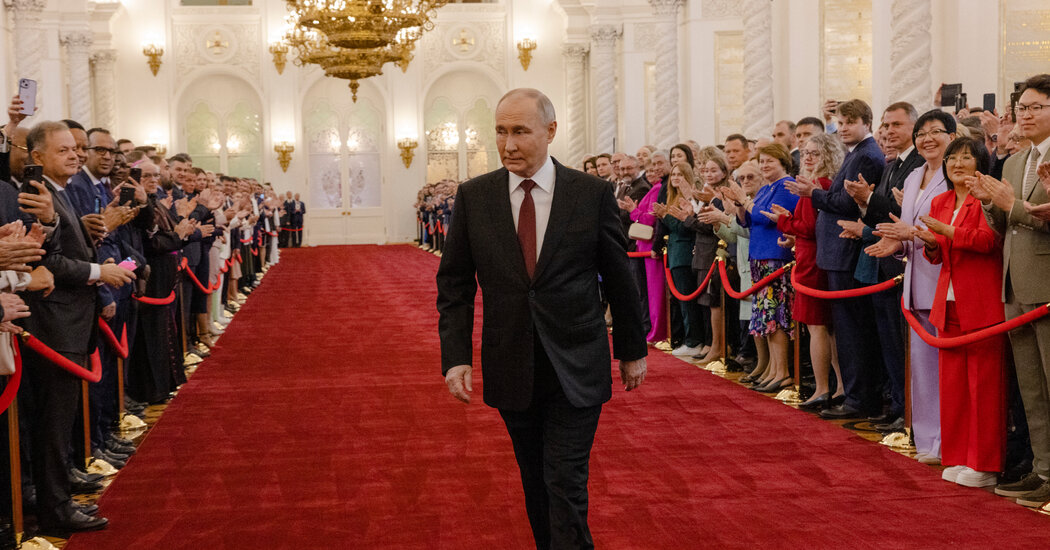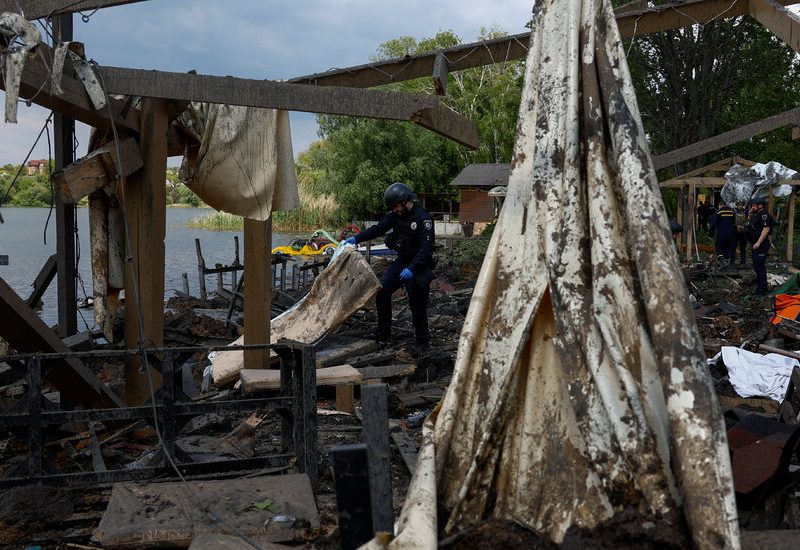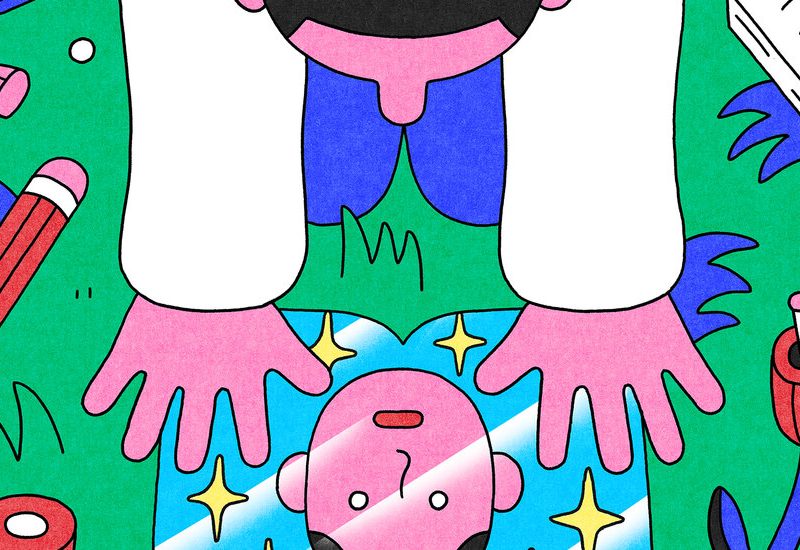Vladimir V. Putin was inaugurated for a fifth term as president on Tuesday in a ceremony filled with pageantry and a televised church service, as the Russian leader tried once more to depict his invasion of Ukraine as a religiously righteous mission that is part of “our 1,000-year history.”
Mr. Putin took the presidential oath — swearing to “respect and safeguard the rights and freedoms of man and citizen” — with his hand on a red-bound copy of Russia’s Constitution, the 1993 document that guarantees many of the democratic rights that he has spent much of his 25-year rule rolling back.
Mr. Putin was re-elected in March in a rubber-stamp contest that Western nations dismissed as a sham. If he serves the full six years of his new term, he will become the longest-serving Russian leader since Empress Catherine the Great in the 18th century.
“Together, we will be victorious!” Mr. Putin said at the end of a speech after he took the oath in the Kremlin’s gilded St. Andrew’s Hall.
The ceremony was replete with pomp: An honor guard marched ahead of Mr. Putin. Elaborate chandeliers hung overhead and supporters stood behind a velvet rope applauding as the Russian leader strode to the stage. Outside, a heavy snow fell, unusual in May, even for Moscow.
Mr. Putin offered no new policy details in his speech, even though analysts expect him to make some changes to the makeup of his government later this week. He also said nothing about the tactical nuclear weapons drills that his military announced on Monday. (Russia’s neighbor and ally, Belarus, had announced its own snap exercises on Tuesday of the forces charged with being trained to use the nuclear weapons that Russia stationed in there last year.)
In a departure from the broadcasts of previous inaugurations, Russian state television dwelled at length on the church service blessing Mr. Putin after he delivered his speech.
“The head of state must sometimes make fateful and fearsome decisions,” Patriarch Kirill I, the head of the Russian Orthodox Church, was shown telling Mr. Putin inside the Cathedral of the Annunciation on the Kremlin grounds. “And if such a decision is not made, the consequences can be extremely dangerous for the people and the state. But these decisions are almost always associated with victims.”
The scene underscored the Kremlin’s intensifying efforts to give a religious sheen to Mr. Putin’s rule and to cast his invasion of Ukraine as justified in Russia’s Christian tradition.
Ksenia Luchenko, an expert on Russian Orthodox Christianity at the European Council on Foreign Relations, said the patriarch’s speech also appeared designed to hand Mr. Putin a religious carte blanche for any future violence he might unleash.
“It looks like, ‘Do whatever you want, because we trust you completely,’” Ms. Luchenko said in a phone interview. “He’s trying to sacralize any decision” Mr. Putin makes, she added.
In his inauguration speech, Mr. Putin also repeated his call for talks that many critics see as tantamount to a demand for capitulation by the West and Ukraine. “We do not reject dialogue with Western states,” he said.
“I will repeat that talks, including on issues of strategic stability, are possible,” he added, referring to arms-control negotiations with the United States that have been stalled since Russia invaded Ukraine in 2022. “But only on equal terms, respecting each other’s interests.”
Isolated from the West and under indictment by the International Criminal Court, Mr. Putin is projecting a power domestically that seems stronger than ever.
“Our president has the highest powers, more than the American president and even the Russian czar,” said Gennady A. Zyuganov, the leader of Russia’s Communist Party, as he arrived at the ceremony in the Kremlin. “A lot depends on him.”
More than 2,000 government officials, prominent supporters and administrators who are part of Russia’s institutions in occupied Ukraine had gathered to witness the tightly stage-managed inauguration.
As supporters assembled, they shared a message demonstrating Mr. Putin’s iron grip on their loyalty: that he would keep Russia stable, strong and peaceful.
Among the first to arrive was the American actor Steven Seagal, who said of Russia’s future, “With President Putin, it will be the best.” (Mr. Putin personally handed Mr. Seagal a Russian passport in 2016.)
Mr. Putin’s preordained election in March delivered him more than 87 percent of the vote, according to Russian election officials, with a voter turnout of almost 80 percent.
“Almost all the country voted for him,” said Aleksandr P. Petrov, a deputy in the Duma, Russia’s lower house of Parliament, striking the tone of absolute loyalty on display at the Kremlin. “Our support for the president is absolute, because our vision of development is taking place in the country.”
Mr. Putin pronounced the brief oath standing next to Valery Zorkin, the head of the Constitutional Court — a body that has steadfastly upheld Mr. Putin’s rollback of the democratic rights.
The crackdown has been chilling to critics of Mr. Putin’s government. Just about all well-known opposition politicians have been jailed. The most prominent, Aleksei A. Navalny, died in a penal colony in the Arctic Circle in February.
His widow, Yulia Navalnaya, condemned Mr. Putin’s inauguration in a video posted on YouTube on Tuesday morning,
“Our country is being led by a liar, a thief and a murderer,” said Ms. Navalnaya, who lives outside of Russia. “But this will definitely come to an end.”
Ahead of Tuesday’s inauguration, Ukraine called on its allies not to recognize Mr. Putin as the legitimate president, citing the illegal holding of presidential elections in Russian-occupied Ukraine. Most Western countries boycotted the ceremony, although France sent its ambassador; the United States did not send a representative but the State Department said it would continue to recognize Mr. Putin as Russia’s leader.
“We certainly did not consider that election free and fair, but he is the president of Russia and is going to continue in that capacity,” Matthew Miller, a State Department spokesman, told reporters on Monday.
As in the past, the tightly scripted state television broadcast melded ceremonial pomp and a depiction of Mr. Putin as a humble, workmanlike leader. Before the ceremony, Mr. Putin was shown getting up from his desk, casually flipping through a sheaf of paper, walking down long and narrow corridors, passing uniformed guards and stepping into a Russian-made limousine that carried him across the Kremlin grounds.
As Mr. Putin was heading to the Kremlin for the ceremony, the chairman of the Duma, Vyacheslav Volodin, told journalists that the Russian president was the envy of the world.
“Our president is the most effective leader among other countries,” Mr. Volodin said. “They envy us, and the tasks before us are understandable and clear, like never before.”
Ivan Nechepurenko, Alina Lobzina, Oleg Matsnev, Aurelien Breeden and Constant Méheut contributed reporting.



